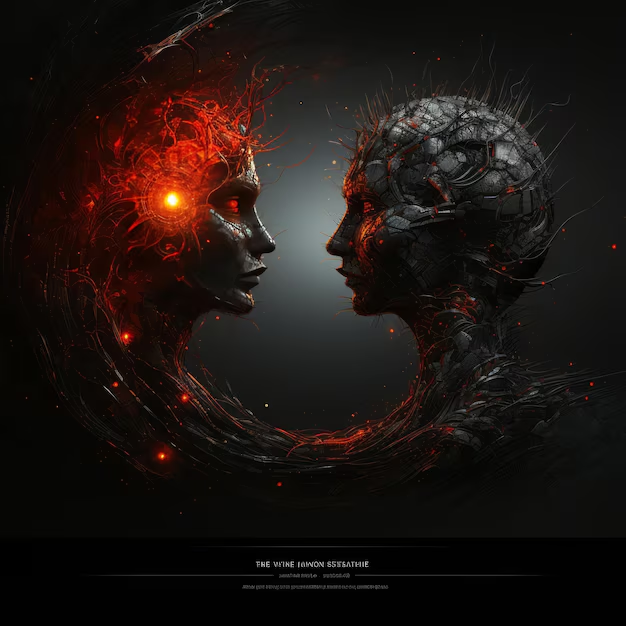In the ever-evolving landscape of technology, the emergence of artificial intelligence (AI) has been a game-changer, captivating the minds of researchers, innovators, and the general public alike. As we witness the rapid advancements in AI capabilities, it’s natural to ponder the implications of this transformative technology and its potential impact on our lives.
At the heart of this discussion lies the intriguing question: how does the human mind, a marvel of evolution, compare to the growing prowess of AI systems? This article aims to delve into this fascinating realm, exploring the nuances of the human mind and the capabilities of AI, while shedding light on the potential for collaboration and the ethical considerations that arise.
Understanding the human mind
The human mind is a complex and enigmatic entity, a product of millions of years of evolutionary refinement. It is the seat of our consciousness, our emotions, and our cognitive abilities. The human mind is a remarkable feat of biological engineering, capable of processing vast amounts of information, making intricate decisions, and engaging in creative and abstract thinking.
One of the defining characteristics of the human mind is its adaptability and flexibility. We possess the ability to learn, evolve, and adapt to new situations, drawing upon our vast repository of experiences and knowledge. The human mind is also adept at intuitive reasoning, pattern recognition, and the ability to draw insights from seemingly disparate pieces of information.
The capabilities of AI
As AI technology continues to advance, the capabilities of these systems have become increasingly impressive. AI algorithms can now outperform humans in a wide range of tasks, from complex data analysis and decision-making to creative endeavors and even strategic game-playing.
The strength of AI lies in its ability to process and analyze vast amounts of data at lightning speed, identify patterns and correlations that may elude the human mind, and make decisions with remarkable precision and consistency. AI systems can also be programmed to learn and improve over time, constantly expanding their knowledge and capabilities.
However, it’s important to note that the human mind still possesses unique strengths that AI has yet to fully replicate. The human capacity for empathy, emotional intelligence, and the ability to navigate complex social interactions are areas where AI still has room for improvement.
Human vs AI: A comparison of strengths and weaknesses
To better understand the relationship between the human mind and AI, it’s helpful to compare their respective strengths and weaknesses:
| Attribute | Human Mind | AI |
|---|---|---|
| Processing power | Limited by the biological constraints of the brain | Virtually unlimited, with the ability to process and analyze massive amounts of data |
| Learning and adaptation | Highly adaptable and capable of learning from experience | Capable of learning and improving over time, but often dependent on the quality and quantity of training data |
| Creativity and innovation | Capable of original and imaginative thinking, problem-solving, and idea generation | Improving in creative tasks, but still largely dependent on the parameters and algorithms designed by humans |
| Emotional intelligence | Highly adept at understanding and responding to emotions, empathy, and social cues | Struggling to fully replicate the nuances of human emotional intelligence |
| Contextual understanding | Able to interpret and understand information within a broader context | Improving in contextual understanding, but still often dependent on the specific data and parameters it was trained on |
| Flexibility and adaptability | Highly flexible and adaptable to changing circumstances and unexpected situations | Improving in adaptability, but often constrained by the limitations of its programming and training |
AI in everyday life: Examples and implications
The integration of AI into our daily lives has become increasingly prevalent, with numerous applications that have transformed the way we live, work, and interact. From personalized recommendations on streaming platforms to autonomous vehicles and virtual assistants, AI has become an integral part of our everyday experiences.
One notable example is the rise of smart home technologies, where AI-powered devices and systems can automate and optimize various household tasks, from energy management to security and entertainment. Another area where AI has had a significant impact is in the field of healthcare, where AI algorithms can assist in disease diagnosis, drug discovery, and personalized treatment plans.
As AI continues to permeate our lives, it’s crucial to consider the implications and potential challenges that may arise. Issues such as data privacy, algorithmic bias, and the displacement of jobs due to automation are just a few of the ethical and societal concerns that must be addressed.
The impact of AI on industries and jobs
The influence of AI on various industries and job markets is undeniable. Across sectors, AI is being leveraged to enhance efficiency, productivity, and decision-making processes. In the financial industry, for instance, AI algorithms can analyze vast amounts of market data to identify trends and make investment decisions with greater accuracy. In the manufacturing sector, AI-powered automation and robotics have transformed production processes, leading to increased efficiency and reduced costs.
However, the integration of AI also raises concerns about job displacement. As AI systems become more capable of performing tasks traditionally carried out by human workers, there is a growing fear that certain jobs may become obsolete. This shift has the potential to disrupt entire industries and create a need for retraining and reskilling of the workforce.
Ethical considerations of AI
As the capabilities of AI continue to expand, the ethical implications of this technology have come to the forefront of the discussion. Questions surrounding the accountability and transparency of AI systems, the potential for algorithmic bias, and the impact on human privacy and autonomy have become increasingly pressing.
One of the key ethical considerations is the issue of AI decision-making and the potential for unintended consequences. As AI systems are tasked with making complex decisions, there is a need to ensure that these decisions are aligned with ethical principles and societal values. This requires a deeper understanding of the algorithms and the data used to train them, as well as the development of robust governance frameworks to oversee the deployment of AI.
Another critical ethical concern is the impact of AI on human employment and the potential for job displacement. While AI can enhance productivity and efficiency, it’s crucial to address the social and economic implications of this technological shift and explore ways to ensure a smooth transition for affected workers.
The future of human-AI interaction
As we look towards the future, the relationship between the human mind and AI is poised to evolve in fascinating ways. While there may be areas where AI surpasses human capabilities, it’s important to recognize that the human mind still possesses unique strengths and qualities that AI has yet to fully replicate.
One promising avenue for the future is the concept of human-AI collaboration, where the complementary strengths of both the human mind and AI are leveraged to tackle complex challenges and drive innovation. By harnessing the human capacity for creativity, emotional intelligence, and contextual understanding, while leveraging the processing power and data-driven decision-making of AI, we can unlock new possibilities and create synergies that benefit both individuals and society as a whole.
Harnessing the power of human-AI collaboration
To harness the power of human-AI collaboration, it’s essential to foster an environment that encourages the integration of these two powerful forces. This may involve developing educational programs that equip individuals with the skills necessary to work alongside AI systems, as well as the creation of interdisciplinary teams that bring together human experts and AI specialists.
Additionally, it’s crucial to continue investing in research and development to further refine and enhance the capabilities of AI, while ensuring that these advancements are guided by ethical principles and a deep understanding of the human mind. By striking the right balance between the strengths of the human mind and the potential of AI, we can unlock new frontiers of innovation and problem-solving.


